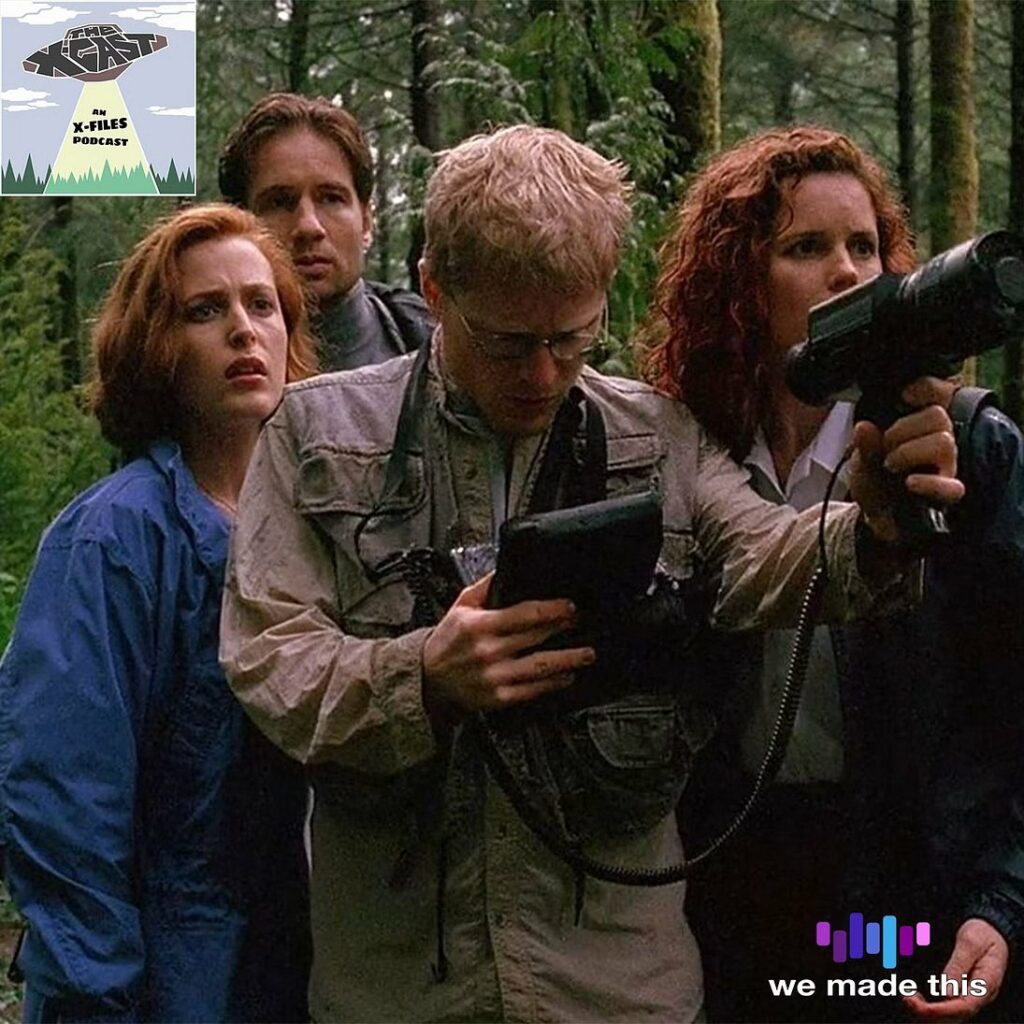
Darin Morgan appearances are rare and should be cherished! His X-Files and Millennium episodes are nearly universally adored. Here is a long interview with him from a couple of months ago by The X-Cast: An X-Files Podcast. It’s hard to summarize what is an excellent interview, but I’ll try! [+ my own comments]
– “Blood“: brother Glen (GM) offered Darin (DM) a story idea. Somebody turned in a script that didn’t work, and DM had to produce a script quickly, he worked on it closely with GM.
– On working with Chris Carter: CC (and Howard Gordon) hadn’t read anything DM had written apart from Blood when they decided to hire him as a writer. DM was reluctant to join the show because it wasn’t comedy but he had no job. CC thought that GM supervised DM more than he actually did. CC liked DM’s scripts, they didn’t need rewriting, and that’s all he wanted from DM. DM has worked on shows where he suggested story ideas that were different from the show’s format and showrunners were not receptive; CC was not like that. [More good words about Carter, he’s hands off but that is also a good thing.]
– On the original run: “Humbug“: GM told DM to write a show about sideshow freaks and Jim Rose. When DM pitched it to CC, it was just the story with no humour, CC told DM to make the creature more mythic or something. When DM turned in the script, CC, to his credit, didn’t say no to it because it wasn’t the format of the show. After he won the Emmy for “Clyde Bruckman“, still nobody recognized him in the street, the only people he knew that were watching the show were his own parents, so success didn’t go to his head. He liked his idea for “War of the Coprophages” but the script didn’t come together like he wanted. He usually likes his stories to be about new characters, not Mulder & Scully; in “War”, the new characters are cartoonish and one-note and it has more M&S. When DM wrote it, he thought he had failed, in comparison to “Clyde Bruckman”, then he had to prove himself with “Jose Chung“, he put a lot of pressure on himself. [“War” a failure?! I wish the show had done more episodes of the same quality as that!] He only has watched one or two “Twin Peaks” episodes, doesn’t get why people say he took inspiration from it [re: “Jose Chung” potato pie scene].
– On S4: Frank Spotnitz’s story that DM didn’t turn in his script then they had to do “Memento Mori” is not true [beef!]. CC had left DM with an open invitation for doing an episode, but DM wouldn’t commit. Having a deadline is one of the reasons why he left the show, he just can’t deal with them.
– On writing for TXF: The story was structured around the scenes at the end of each act (commercials breaks). DM tried to avoid fade-out / fade-in happening in the same scene; but at times there was no other place to go to (like 3rd act of “Clyde Bruckman”). For the revival there was an additional act, more commercials: this reduced the number of scenes, made acts shorter, made it difficult to develop a rhythm. [I think that’s a very important point and a reason why many felt the revival was rushed and a lot of noise for nothing.] Showing “Forehead Sweat” to his father, he realized that he tends to come back from acts in a different setting or with an unrelated character, confusing the viewer.
– On directing: “I’m not a barker”! He cares about actor performance, guide them through what the show is like, pull them towards more comedy instead of drama. Directing is getting the performance, not just technical stuff.
– On editing in TXF: “Imagine you have to cut two minutes from your favourite episode.” They had to follow time strictly, exactly 44 min 12 secs (revival: 2 min less). “Jose Chung” was his only episode that had the right length, all his others were over by like 6 min. CC’s scripts are short, GM and DM’s are not. Scripts are written in such a way you can’t remove an entire scene, even if that scene is not great, so you have to cut lines or jokes here and there. He has dailies from his MM episodes, but not cut scenes.
– On his “Millennium” episodes: it was painful. He disagreed that the show was too bleak: the subject matter was dark, but in his episodes he had a record number of suicides and they were considered “comedic”. MM viewers were much less open to change than TXF viewers: the people least likely to like DM’s MM episodes were the people who watched MM. In S2 Fox wanted change to increase viewers; but the captive audience from S1 liked what they saw, the lost viewers won’t return, it was a no-win situation.
– On preparing the revival: CC took GM & DM to dinner, they were hoping to do 10-12 episodes, he wanted to bring as many of the old crew back. DM “was like yeah that could be fun let’s do some more”, he never thought that TXF’s time is past. [Funny, that feels completely different to how his last episode ends!] He liked to have the freedom to do whatever he wanted. Fox marketed the revival as a limited series and the audience was expecting a continuing story, he thinks the reaction would have been different if it had been marketed as new episodes in the same format as in the past. [Maybe?]
– On his revival episodes: Back in the 90s, he had a story idea: a ghost story, but you find out it was a ghost only at the end. He thought of writing a feature about that, time passed, then “The Sixth Sense” came out and he knew the twist while watching! In Frank Spotnitz’s “The Night Stalker” revival, he wrote the “Were-Monster” script, and the day he finished it the show was cancelled. For years he lived in fear somebody would do that “man biting monster” story. With the revival he thought here’s my chance to put the story out there. The first 2 days of shooting “Were-Monster” were the graveyard scene. Writing “Forehead Sweat” was difficult as ever, but shooting it was the most fun he has ever had in his career. Recurring actors: DM likes to have a stock company of actors, like the movies in the 1930s.
– On the audience reception of the revival: when they set out to do the revival, DM was glad he wouldn’t have to deal with viewer comments about TXF not being comedy, but it happened again! With “Humbug”, people liked that they did something different, but with “Were-Monster” people freaked out, weird. Is the audience really more sophisticated? In today’s shows, every episode follows the same format, tone, style, a single continuing story, no new character or location. TXF didn’t do that. [Not sure things are so monolithic.]
– A thought experiment: if your favourite episode had aired in the revival, would you like it as much? DM thinks not; and conversely, people would have hated “War” if it had aired in the revival. In the revival there was no worry to tarnish the reputation of the show, it had already been tarnished by the last seasons and the second movie. [I love this!] But he was wrong! By the time the revival aired, people saw the original run as perfect, even the movie was reevaluated upwards. The revival was the same as ever, with ups and downs. “DPO” he thought was not a good ep, now people love it. He’s worried that people will never be watching the revival in the future. “Forehead Sweat” is more relevant now than back when it aired, and unfortunately more so next year [2024 – ouch!]. [I understand his point, but I don’t entirely agree here. On the one hand he seems to agree there was a drop of quality towards the later seasons, on the other hand he thinks there were always ups and downs and the revival was no different. There’s a lot of nostalgia in fandom, but it’s not only that.]
